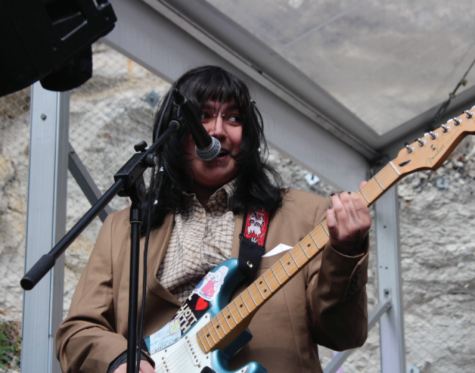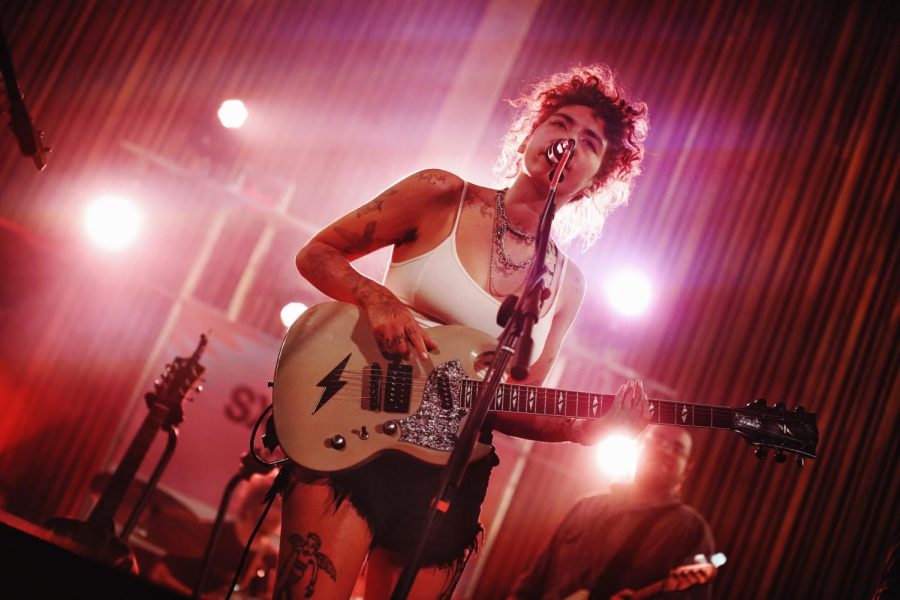Music To My Ears
SXSW Boasts Wide Lineup of Musical Artists
kayla
BLINDING LIGHTS SXSW Headliner Indigo De Souza performs songs from her newest album, All of this Will End. De Souza is an indie rock artist native to Asheville, North Carolina. photo by Kayla Le
May 15, 2023
South By Southwest (SXSW) was initially founded in 1987 by Roland Swenson, Louis Jay Meyers, Louis Black, and Nick Barbaro, who were all united by the belief that Austin’s local music and creative communities were talented enough to perform for more people, but were limited by a lack of exposure outside of Austin. Today, the festival has grown to be a week-long film and music festival that is accompanied by interactive elements such as technology exhibitions and keynote speakers. The SXSW music festival has grown to feature prominent international showcases, with hours of performances by artists from Taiwan to Australia, according to the SXSW schedule. Although many musicians travel from all over, there are also many local artists that are able to share their music to a large global audience. SXSW has a diverse range of musicians, giving smaller and local artists a chance to find their footing and achieve their creative goals according to the website.
Kevin Gately is a local musician and drummer in the band Plastique, a band that focuses on a subgenre of rock called noise rock. According to Gately, Austin’s music scene has had a huge impact on his life since he was a high schooler in San Antonio and throughout his college experience at University of Texas at Austin (UT). Gately said being immersed in the live music in Austin encouraged him to experiment with his own music.
“When I was in high school myself, in San Antonio, when [my friends and I] were just getting into rock music and forming our own opinions about music, we would often sneak out of our houses and drive from San Antonio to Austin to see bands play, and then drive back that same night,” Gately said. “It was a rebellious thing that we did, and it just seemed so cool and fun to be in a band, and then in college my friends and I would just constantly go see bands play.”
The Tiarras are another local band made up of three sisters, Sophia, Tori, and Tiffany Baltierra, who have influences of Latin, reggae, and indie throughout their music. The trio grew up in Austin and have gotten to see the Austin music community change, adapt, and grow over the years along with SXSW.
“SXSW is something we all know is going to happen, but it’s expanded every year,” Tori Baltierra said. “Especially after the pandemic, we really missed live music, and we weren’t able to connect in that way… I think this was the year Austin really got to fully tap back into what South By was before the pandemic.”
SXSW has a combination of badge-required and free events throughout the city which gives everyone access to a lot of different genres and musicians. The mass amount of exposure, according to Gately, gives local musicians the opportunity to share their music to a vast audience all while staying in their hometown.
“During SXSW, people from other cities are coming to Austin, and so [artists] are able to accomplish sharing their music without having to leave Austin,” Gately said. “They can make a name for themselves without having to go anywhere. There’s still so many bands and so many artists. There’s so much noise that it would be hard to cut through, but I think for the most part it is a good thing for local bands to be a part of it as much as it is for out of town bands to come to Austin.”
This year, The Tiarras were able to perform in a showcase at Stubb’s BBQ restaurant hosted by Diversity Awareness and Wellness in Action (DAWA), an organization that empowers, supports, and creates space for Black, Indigenous, people of Color (BIPOC) creators. The event, hosted at Stubb’s, spotlighted many important charities and musicians of color such as The Tiarras.
“It was just nice to be a part of a showcase that showcased artists of color, and people in Austin, because these are big artists, but not everybody knows about them,” Sophia Baltierra said. “And with SXSW, a lot of the time you think of artists from Australia, or artists with big names, and people want to see them, but these artists are in our backyards. Their voices deserve to be heard. Their art deserves to be seen, so it was nice to be a part of that too.”

musical artists, speakers, and inventions. photo by JC Ramirez Delgadillo
Tori Baltierra said being an Austin artist goes beyond music – it’s about community. According to her, locally run festivals like Latinapalooza, which began six years ago as an unofficial SXSW Day Show, are also fundamental to the Austin music culture.
“Austin artists are very resilient,” Tori Baltierra said. “Even when we’ve gone through periods where we don’t get a lot of shows, or when we’ve had to fight for reasonable pay, even at local shows, even at shows run by the city. We are just very persistent, and we really cling onto our purpose. Because Austin calls itself the live music capital of the world, we hold everyone accountable for that title, even ourselves. We work hard. We try to connect with other artists, and see what we can do for them.”
Gately agrees that Austin being known as the live music capital of the world holds a weight to it. According to him, the music created by local artists is what draws people around the world to the city.
“There’s a magnetism, a gravitational pull about Austin that is pulling young musicians from other parts of the country, other parts of the state,” Gately said. “Austin has a reputation that kind of perpetuates itself. People hear that Austin is where musicians are, so other musicians want to come whereas other places don’t have the same oasis appeal for musicians.”


